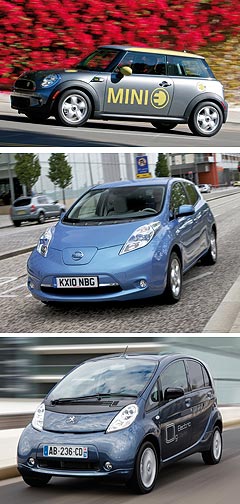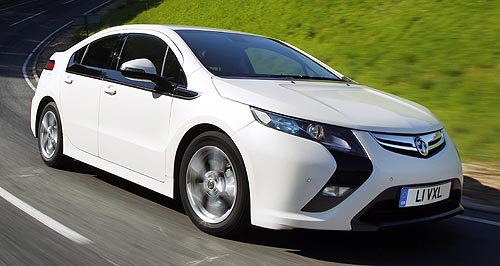Make / Model Search
News - General News - Electric VehiclesBritain locks in electric vehicle subsidyPrice boost: The Vauxhall Ampera plug-in hybrid vehicle would benefit from UK's new electric vehicle incentives. New UK government announces $8728 plug-in car grant from 201129 Jul 2010 BRITAIN has moved to plug its car manufacturing industry into the emerging electric vehicle market by announcing electric car grants of up to 5000 ($A8728) for UK motorists from January 2011. The move has prompted calls in Australia for the federal government to consider incentives for low-carbon vehicles to ensure this country is not left behind in the race to embrace greener technologies. The UK policy – covering electric, plug-in hybrid and hydrogen fuel-cell cars – was originally proposed by the previous Labour Government but has now been confirmed by Coalition Government transport secretary Philip Hammond. However, unlike the open-ended 230 million ($A400m) Labour plan, the new scheme will be reviewed after one year and has a budget of just 43 million ($A75m) – sufficient for just 8600 cars in a market with annual sales of two million. Buyers get a rebate of 25 per cent of the price of the car, up to a maximum 5000. All of the first generation of electric cars eligible for the grant, such as the Nissan Leaf, Mitsubishi i-MiEV and Telsa Roadster sports car, cost more than £20,000. The grant will cut the price of Nissan’s Leaf from £28,350 to £23,990 ($A41,864), including 20 per cent value-added tax. Australia offers no such incentives – a situation that importers and manufacturers would like to see remedied. Federal Chamber of Automotive Industries CEO Andrew McKellar told GoAuto that if Australia was to attract the new wave of alternative fuel vehicles – particularly in the early stages of their development – the government would need to evaluate a similar scheme. He said, however, the chamber did not favour a scheme that restricted incentives to any one technology, such as EVs or plug-in hybrids, but a broader, “technology neutral” policy applying to any low-emissions vehicle. “A range of technologies are being developed by the various brands, so it would need to be broadly based,” he said. “There are a number of international precedents that could be evaluated.”  From top: Mini E, Nissan Leaf, Peugeot iON. From top: Mini E, Nissan Leaf, Peugeot iON.One such scheme operates in France, where vehicles emitting less than 60gm of CO2 per kilometre attract a €5000 subsidy. At least 20 developed countries now offer some sort of incentives on low-emission vehicles, ranging from exemption from registration charges to subsidiaries of up to €7000 ($A10,176) in Norway. With plug-in vehicles in short supply globally, manufacturers are favouring such countries with initial volumes and shunning countries such as Australia. The UK grant matches the highest government incentives available in the United States, where plug-in cars attract tax breaks of up to $7500 ($8386). The incentives are designed to encourage both consumers and motor manufacturers to step up EV volumes. Like Washington, Westminster is keen for major car companies to base their plug-in EV production in local car industries to guarantee their future. Nissan has already confirmed European Leaf production – along with a major lithium-ion battery factory – at its Sunderland plant in northern England from 2013. General Motors is also likely to be convinced to make its Volt-based Vauxhall/Opel Ampera for Europe at its Ellesmere Port factory in Liverpool. BMW’s Mini plant at Cowley is also producing small numbers of the Mini E, while Toyota is making the hybrid Auris (Corolla) in Burnaston, Derbyshire. The grants announced by Mr Hammond apply to electric, plug-in hybrid or hydrogen fuel cell cars, provided they meet safety, reliability, performance and warranty standards set by the Office for Low Emissions Vehicles (OLEV). The scheme is subject to EU approval and will run until March 2012, but will be reviewed in January 2012. “The coalition government is absolutely committed to low carbon growth, tackling climate change and making our energy supply more secure,” he said. “We are sending a clear signal that Britain is open for business and that we are committed to greening our economy. This will ensure that the UK is a world leader in low-emission vehicles.” The move, accompanied by grants to install 11,000 EV charging posts in London and other areas of the UK, was warmly welcomed by the UK motor industry. Society of Motor Manufacturers and Traders (SMMT) chief executive Paul Everitt described it as a significant commitment by the new government to create thousands of high-skill jobs in the emerging market for ultra-low carbon vehicles. “The UK is well placed to exploit the global opportunities in the transition to low carbon technologies and is already making significant progress through R&D, the low carbon supply chain and vehicle manufacturing,” he said. Vauxhall managing director Duncan Aldred said the incentives to stimulate low-carbon vehicle technology would fast-track carbon cuts from motor vehicles. Nissan released a statement saying the incentives signalled that Britain was serious about supporting new low-carbon technologies and helping consumers to make more sustainable choices. “Consumer incentives will bring electric vehicle ownership within reach of UK motorists and make cars like the Nissan Leaf a financially viable alternative to conventional petrol and diesel-powered cars,” it said. Nissan and its partner Renault are planning to launch the Leaf and the related Fluence EV in 2011, making them major beneficiaries of the scheme next year. The Chevrolet Volt plug-in hybrid is not expected to hit the UK market until 2012, meaning any incentive for it is likely to depend on a government decision to extend the program beyond the first 15 months.  Read more28th of July 2010  Chev Volt plugged in for as little as $37kSharp price and lease deals announced for GM’s Volt – helped by big tax breaks18th of May 2010  Nissan Leaf priced at $38,534 in UKBritish Nissan EV price undercuts Mitsubishi i-MiEV sticker by 30 per cent |
Click to shareGeneral News articlesResearch General News Motor industry news |











Facebook Twitter Instagram